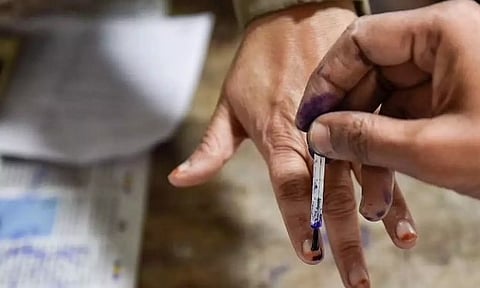

NEW DELHI: Even as the Congress is all geared up for the poll battle in the five states of Mizoram, Telangana, Madhya Pradesh, Rajasthan and Chhattisgarh, the grand old party’s plank of “social justice” for the 2024 election will face its first test here.
On October 9, the four-hour meeting of the Congress Working Committee (CWC), the party’s highest decision-making body, held at the party headquarters announced that it was unanimous in making “social justice” the main plank for the 2024 election.
The CWC made three announcements to this effect, which included that a government led by the Congress would conduct a caste census to find the number of other backward classes (OBCs), remove the cap of 50 per cent reservation for OBCs, Scheduled Castes (SCs) and Scheduled Tribes (STs) through an Act of Parliament, and finally, offer 33 per cent quota to women lawmakers, including a separate quota for OBC women, at the earliest.
Even former party chief Rahul Gandhi argued that the “rights of a community should be proportional to its population in society”.
However, the party leaders feel that the caste census is required to find the number of other backward classes (OBCs), remove the cap of 50 per cent reservation for OBCs, SCs and STs through an Act of Parliament for ensuring justice for the people and to give them their rights.
According to party leaders, in Telangana there are over 52 per cent voters from the OBC community. “In Telangana, Congress is attached with the people through former Prime Minister Indira Gandhi and former party chief Sonia Gandhi, who gave it statehood in 2014. However, with no government at the Centre and in the state the party needs to connect with the OBCs and the SC and ST communities to defeat the BRS and the BJP,” a leader wishing not to be named said.
The party leader said that the Congress did not have big faces in the state as in the last 10 years, several senior leaders could not ensure the party’s victory in the state in last two elections. Thus the promises of the caste census, OBC, SC and ST reservation and the six guarantees by the party are the main big poll plank, he added.
However, the situation is a bit different in Rajasthan, where the Congress is hoping on its seven guarantees.
In Madhya Pradesh, where the Congress government was toppled in 2020 just 14 months after it came to power, the party has fielded 62 out of 230 candidates from the OBC community.
The party leaders feel that the Congress guarantees and the OBC representation are a major hit among the public, thus it is hoping to make a comeback in the state polls.
Similarly in Chhattisgarh, which is a tribal dominated state, the grand old party is hoping to return to power on the work of the Bhupesh Baghel government in the last five years.
A party leader here said that the Congress is hoping to ride its welfare "guarantees" and caste census promise to ensure that it enters the "finals" in 2024 as a formidable challenger to the BJP by winning in all the five states.
The party had won the Rajasthan, Madhya Pradesh and Chhattisgarh assembly elections in 2018, however, it was unable to bank on the narrative in the 2019 Lok Sabha polls.
Thus, through the caste census promise it wants to enter the 2024 finals not as a minnow, the party leader added.
In the 2023 assembly polls, the Congress is looking to retain power in Rajasthan and Chhattisgarh while seeking to come to power in the other three states going to the polls -- Madhya Pradesh, Telangana and Mizoram.
Meanwhile, another party leader said that traditionally the “forward castes” have been supporting the BJP and thus the grand old party needs to expand its base among the OBCs, SCs, STs and minorities.
Congress leader Supriya Shrinate had earlier told IANS that the Congress is not raising this issue so that it helps it politically.
“I think it’s an issue that should be raised. It’s a vast majority of our people - almost over 50 per cent who are not represented fairly.When Rahul ji speaks about 90 secretaries in the government with only three being OBC, it should concern us all. We should question that why only 4% Professors across central universities are from the OBC community, we must ask why are only nine per cent of faculty in the IITs and 6% in IIMs from the SC, ST, OBC communities?
"How can we ensure equitable growth when in the last 10 years the literacy rate and purchasing power parity of OBCs has gone down? These are serious questions of representation, and not some political points to be scored,” Shrinate said.
The counting of votes in the five states will take place on December 3.